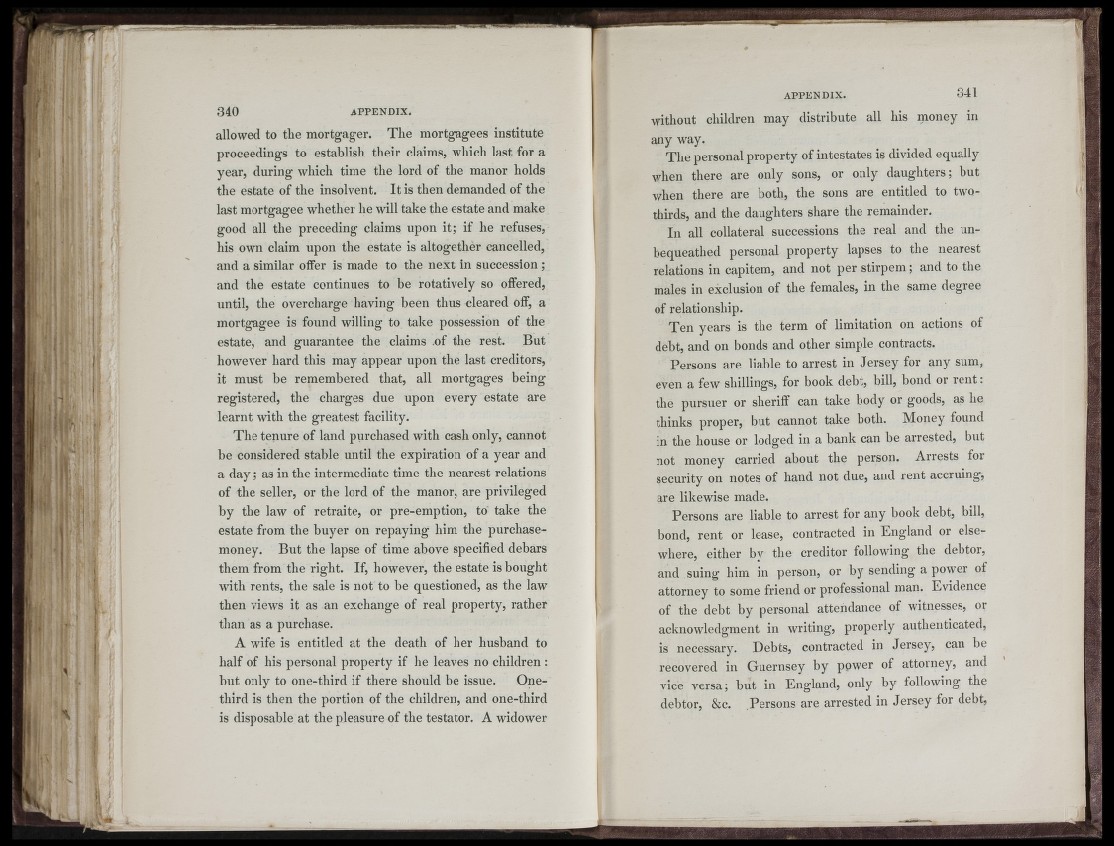
' ' ' « i'. w
T
Ü 1 ÎV
U'' •«!
i ' t..
71 f
i '1
ii ' i
' ■ 1
J.
r :
. ;
. Hsséste;!/
340 APPENDIX.
allowed to the mortgager. The mortgagees institute
proceedings to establish their claims, which last for a
year, during which time the lord of the manor holds
the estate of the insolvent. It is then demanded of the
last mortgagee whether he will take the estate and make
good all the preceding claims upon it; if he refuses,
his own claim upon the estate is altogether cancelled,
and a similar offer is made to the next in succession ;
and the estate continues to be rotatively so offered,
until, the overcharge having been thus cleared off, a
mortgagee is found willing to take possession of the
estate, and guarantee the claims .of the rest. But
however hard this may appear upon the last creditors,
it must be remembered that, all mortgages being
registered, the charges due upon every estate are
learnt with the greatest facility.
The tenure of land purchased with cash only, cannot
be considered stable until the expiration of a year and
a day ; as in the intermediate time the nearest relations
of the seller, or the lord of the manor, are privileged
by the law of retraite, or pre-emption, to take the
estate from the buyer on repaying him the purchase-
money. But the lapse of time above specified debars
them from the right. If, however, the estate is bought
with rents, the sale is not to be questioned, as the law
then views it as an exchange of real property, rather
than as a purchase.
A wife is entitled at the death of her husband to
half of his personal property if he leaves no children :
but only to one-third if there should be issue. One-
third is then the portion of the children, and one-third
is disposable at the pleasure of the testator. A widower
APPENDIX. 341
without children may distribute all his money in
any way.
The personal property of intestates is divided equally
when there are only sons, or only daughters; but
when there are both, the sons are entitled to two-
thirds, and the daughters share the remainder.
In all collateral successions the real and the unbequeathed
personal property lapses to the nearest
relations in capitem, and not per stirpem; and to the
males in exclusion of the females, in the same degree
of relationship.
Ten years is the term of limitation on actions of
debt, and on bonds and other simple contracts.
Persons are liable to arrest in Jersey for any sum,
even a few shillings, for book debt, bill, bond or r e n t.
the pursuer or sheriff can take body or goods, as he
thinks proper, but cannot take both. Money found
in the house or lodged in a bank can be arrested, but
not money carried about the person. Arrests for
security on notes of hand not due, and rent accruing,
are likewise made.
Persons are liable to arrest for any book debt, bill,
bond, rent or lease, contracted in England or elsewhere,
either by the creditor following the debtor,
and suing him in person, or by sending a power of
attorney to some friend or professional man. Evidence
of the debt by personal attendance of witnesses, or
acknowledgment in writing, properly authenticatecl,
is necessary. Debts, contracted in Jersey, can be
recovered in Guernsey by power of attorney, and
vice versa; hut in England, only by following the
debtor, &c. Persons are arrested in Jersey for debt,
Ivri